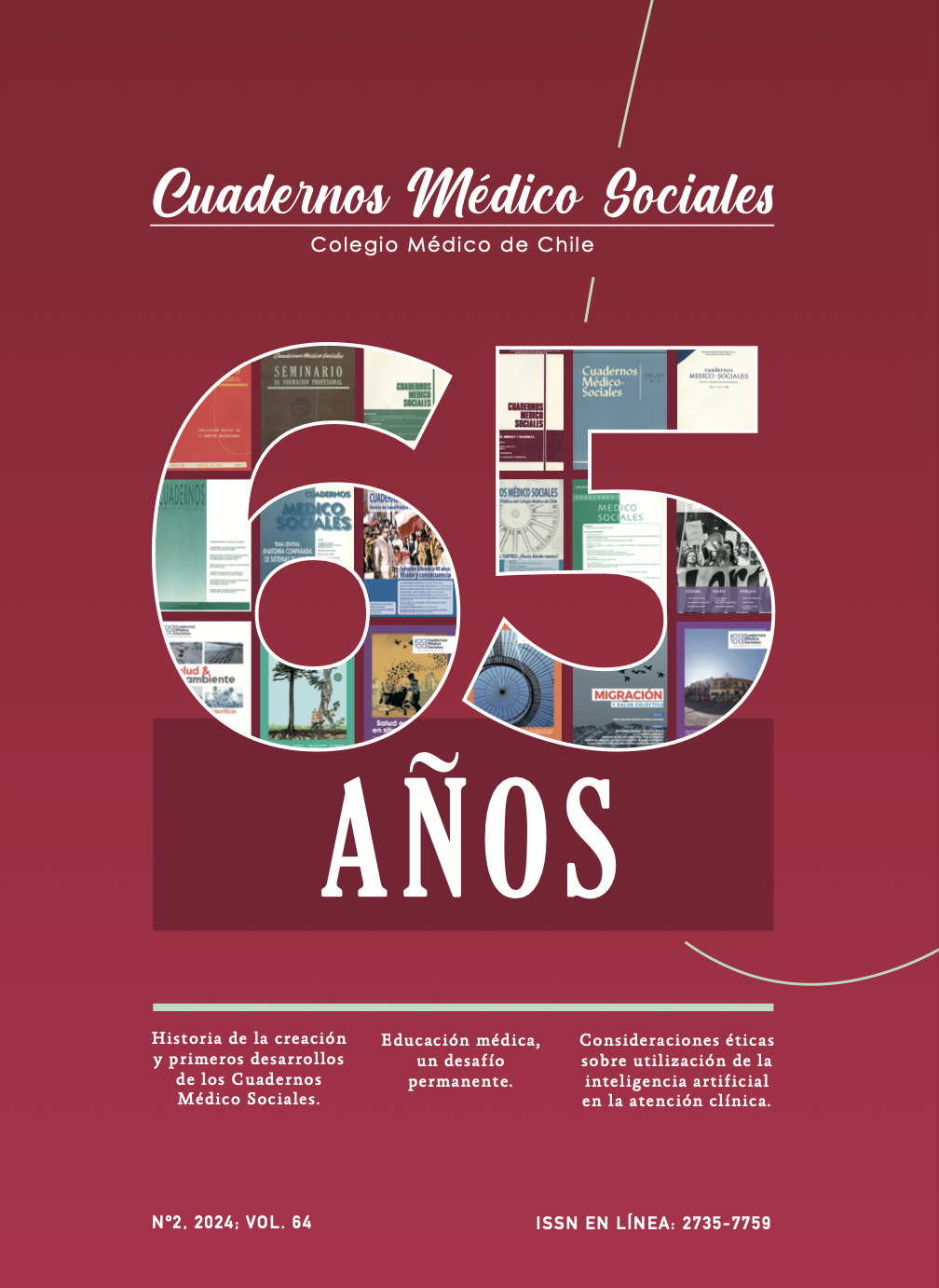Ethical considerations on the use of artificial intelligence in clinical care
DOI:
https://doi.org/10.56116/cms.v64.n2.2024.1952Keywords:
Artificial Intelligence, Delivery of Health Care, Ethics, Physician-Patient RelationsAbstract
The development of the so-called “Artificial Intelligence” (AI) and some promising results motivate a reflection on the applications of AI to human health care, its potential advantages, drawbacks, possible repercussions on the doctor-patient relationship, exercise and nature of medicine and relevant epistemic problems.
Certain ethical conditions are mentioned, considered necessary for the introduction of AI in clinical practice, highlighting the need to increase the knowledge of all those involved about its decisional criteria, responsibilities of those who apply them and the need for objective controls over the results obtained, respecting always personal dignity.
Downloads
References
Alandete D. (2011) John MacCarthy, el arranque de la inteligencia artificial. El País, 27 de Octubre de 2011. Disponible en: https://elpais.com/diario/2011/10/27/necrologicas/1319666402_850215.html
Bakken, S. (2023). AI in health: keeping the human in the loop. Journal of the American Medical Informatics Association, 30(7), 1225-1226
Byung-Chul Han. (2021) No-cosas: Quiebras del mundo de hoy. Editorial Taurus, Oct. 2021.
Chai SY, Hayat A, Flaherty GT. (2022) Integrating artificial intelligence into hematology training and practice: Opportunities, threats and proposed solutions. Br J Haematol. 2022;00:1-5
Helm M, Swiergosz AM, Haeberle HS, Karnuta JM, Schaffer JL, Krebs VE, Spitzer AI, Ramkumar PN. (2020) Machine Learning and Artificial Intelligence: Definitions, Applications, and Future Directions. Current Reviews in Musculoskeletal Medicine. 2020; 13:69-76
Huynh LM, Ahlering TE. (2018) Robot-Assisted Radical Prostatectomy: A Step-by-Step Guide. JOURNAL OF ENDOUROLOGY Volume 32, Supplement 1, May 2018:S28-S32
iHEALTH - Instituto Milenio en Ingeniería e Inteligencia Artificial para la Salud. (2019) https://i-health.cl/ Comisión “Desafíos del Futuro, Ciencia, Tecnología e Innovación”. Inteligencia Artificial para Chile. Senado de la República de Chile. Septiembre de 2019. Disponible en: https://www.senado.cl/noticias/congreso-futuro/comision-desafios-de-futuro-propone-estrategia-de-inteligencia. Consultado el 16 de Agosto de 2023.
Kloka JA, Holtmann SC, Nürenberg-Goloub E, Piekarski F, Zacharowski K, et al. (2023) Expectations of Anesthesiology and Intensive Care Professionals Toward Artificial Intelligence: Observational Study JMIR Form Res 2023;7:e43896) doi: 10.2196/43896. Disponible en: https://www.ncbi.nlm.nih.gov/pmc/articles/PMC10337415/pdf/formative_v7i1e43896.pdf Consultado el 26 de Agosto de 2023-
Matek C, Krappe S, Munzenmayer C, Haferlach T, Mar C. (2021) Highly accurate differentiation of bone marrow cell morphologies using Deep neural networks on a large imagen data set. Blood, Nov 2021, 138(20):1917-27
McCarthy J. (1959) Programs with common sense. Computer Science Department. Stanford University. 1959.pp.1-15. Disponible en: http://jmc.stanford.edu/articles/mcc59/mcc59.pdf. Consultado el 14-09-22
McCarthy J. (2004) What is artificial intelligence. Computer Science Department. Stanford University. 2004. pp.1-15. Disponible en: http://jmc.stanford.edu/articles/whatisai/whatisai.pdf. Consultado el 14-09-22
Ministerio de Salud de Chile. (2018). Presentación de software para prevención de ceguera. MINSAL, Chile. 23 de Mayo de 2018. Disponible en: https://www.minsal.cl/ministro-de-salud-presenta-software-que-permitira-triplicar-la-cantidad-de-examenes-para-prevenir-la-ceguera-diabetica/Consultado el 17 de Agosto de 2023.
Mori Y, Kudo S, Misawa M, Saito Y, Ikematsu H, et al. (2018) Real-Time Use of Artificial Intelligence in Identification of Diminutive Polyps During Colonoscopy: A Prospective Study Ann Intern Med. 2018 Sep 18;169(6):357-366
Mueller B, Kinoshita T, Peebles A, Graber MA, Lee S. (2022) Artificial intelligence and machine learning in emergency medicine: a narrative review. Acute Medicine & Surgery 2022;9:e740. doi: 10.1002/ams2.740
OMS. (2021) Ética y Gobernanza de la Inteligencia Artificial en el ámbito de la Salud. Orientaciones de la OMS.WHO. Switzerland. 2021.
OPS. (2921) La inteligencia Artificial en la Salud Pública. Caja de Herramientas: Transformación Digital. OPS.2021. PAHO/EIH/IS/21-011.
Phillips (2022) El agotamiento del personal en la salud es cada vez mayor. ¿Puede la IA ayudar a aliviar la carga?abr 26, 2022.En: https://www.philips.cl/a-w/about/news/archive/standard/blogs/innovation-matters/2022/20220426-staff-burnout-in-healthcare-is-growing-can-ai-help-ease-the-burden.html
Roma (2020) Rome call for AI Ethics, RenAIsance Foundation. Vatican City. www.romecall.org. Roma, 28/02/2020.
Silcox C. (2020) La inteligencia artificial en el sector salud. Banco Interamericano de Desarrollo. 2020. Disponible en: https://publications.iadb.org/publications/spanish/document/La-inteligencia-artificial-en-el-sector-salud-Promesas-y-desafios.pdf Consultado el 27 de Julio de 2022.
Steiner DF, MacDonald R, Liu Y, Truszkowski P, Hipp JD, Gammage C, et al. (2018) Impact of Deep Learning Assistance on the Histopathologic Review of Lymph Nodes for Metastatic Breast Cancer Am J Surg Pathol2018;42:1636–1646
The International Agency for the Prevention of Blindness. (2019) DART: impacto de tamizaje nacional con inteligencia artificial. 28 de Junio de 2019. Disponible en: https://www.iapb.org/news/dart-impacto-de-tamizaje-nacional-con-inteligencia-artificial/ Consultado el 17 de Agosto de 2023.
Turing M. (1950) Computing Machinery and Intelligence. Mind, 1950, 59,236:433-460
Downloads
Published
How to Cite
License
Copyright (c) 2024 Dr. Carlos Echeverria B., Dr. Alberto Rojas O., Dra. Anamaria Arriagada U., Dr. Rodrigo Salinas R., Dra. Paulina Taboada R., Dr. Gonzalo Ruiz-Esquide S., Dra. María Ángeles Rodrfíguez S., Dr. Hernán Borja R.

This work is licensed under a Creative Commons Attribution-NonCommercial-ShareAlike 4.0 International License.


